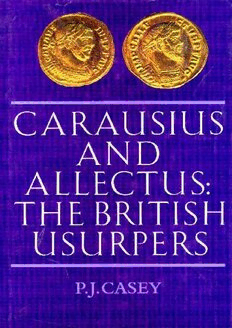
Carausius and Allectus: The British Usurpers PDF
212 Pages·1994·4.775 MB·English
Most books are stored in the elastic cloud where traffic is expensive. For this reason, we have a limit on daily download.
Preview Carausius and Allectus: The British Usurpers
Description:
Under Carausius and his successor Allectus, Britain for a decade (AD 286-96) achieved an independence which threatened the stability of the Roman Empire. With coastal areas of Gaul also forming part of the separatist dominion, the crisis led to the creation of a second tier of imperial rulers. Constantius Chlorus was promoted to suppress the revolt and his success paved the way for his son Constantine - who was to use the province recovered by his father as the base for his own bid for imperial recognition. His success - and his adoption of Christianity as the state religion - was to shape the world in which we still live. This little known but extraordinary episode in the history of Roman Britain has been brilliantly pieced together by John Casey, through a painstaking - and at times detective-like - sifting of the literary, archaeological and numismatic evidence. The latter is as rich as it is complex and is presented with an irresistible mixture of enthusiasm and clarity. What emerges is that the independence of Britain was based upon navel power. These rulers controlled the sea lanes of the English Channel and North Sea in a way that no naval force had done since the time of Augustus. In the aftermath of defeat, the abolition of a unified naval command reduced the Roman response to seaborne raiders to a reactive stategy, rather than an aggressively campaigning one. In the long term this dramatic episode was to play a significant, if fluctuating, part in popular political mythology. In the centuries when insular debate was paramount, the revolt held its place in literary and historical discussion, with legendary accretions freely grafted on; interest waned during the eighteenth century - only to be rekindled in the present century, when a revival of Carausian studies coincided with a return to insularity and a redefinition of political horizons.
See more
The list of books you might like
Most books are stored in the elastic cloud where traffic is expensive. For this reason, we have a limit on daily download.
